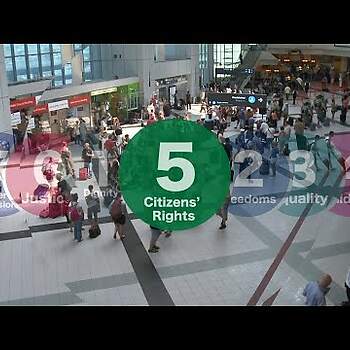The 1990s marked the dawn of a new era with significant historical events such as the fall of the Berlin wall in 1989 (read more here) and the end of Apartheid in South-Africa. Nelson Mandela's release in 1990 led to a democratically elected government in the country in 1994 (read more here). These events, along with the perceived triumph of liberal democracies and market capitalism over authoritarianism and communism—the so-called “End of History”— marked the beginning of the ‘third’ wave of globalisation.
Prior to this, there were two major waves of globalisation. The first wave spanned from approximately 1860 to 1914 while the second one emerged after the second World War in 1945 and ended in the early 1970s with the collapse of the Bretton Woods system in 1971 and the subsequent oil crises. In the 1980s, the rise of neoliberalism under leaders like Reagan and Thatcher coincided with advancements in technology, enabling faster and more affordable exchange of international information. The fall of the Berlin wall then ushered in the ‘third-wave’ of globalisation, characterised by reduced trade barriers and increased capital mobility. These developments marked the early years of a ‘global information economy’.
The rise of the internet, mobile phone usage, and enhanced global travel possibilities facilitated the emergence of transnational connections between people. Transnational communication became easier than ever before, enabling the formation of global movements. It allowed individuals to connect beyond national borders, fostering awareness of issues beyond local communities and the nation-state. These years also saw further progress in European Integration, culminating in the signing of the Maastricht Treaty on February 7th 1992. This Treaty laid the foundation for the European Union (EU), establishing three pillars within the EU (European Communities, Justice and Home Affairs, Common Foreign and Security Policy) and eventually leading to the adoption of the euro in 2002. Additionally, the Maastricht Treaty had significant implications for the concept of international citizenship.
EU citizenship was formally established, granting citizens of EU member states the right to live, work and study in any EU member state. Moreover, it provided EU citizens residing in a different member state with the right to participate in local, regional and EU elections. Currently, there are nearly 450 million EU citizens, of which over 17 million reside in a different EU member state.
In 1997 the Kyoto Protocol addressing climate change was accepted by 84 countries worldwide. However, major greenhouse gas emitters such as the United States, China, and Australia chose not to sign the agreement, fearing potential adverse effects on their economic interests and domestic markets, while the European Union and Japan did sign the agreement.
Novib becomes Oxfam Novib
Novib joined Oxfam International in 1994, a global collective of independent organisations dedicated to fighting poverty and injustice worldwide. This collaboration enabled Novib to expand its reach internationally and enhance its effectiveness in assisting those in need. During this period, in addition to the ongoing focus on the Global South, there was increased attention given to providing aid in new countries in Eastern Europe following the fall of the Iron Curtain.
Oxfam Novib began working closely with organisations from Oxfam International’s network, including countries like Canada, Australia, New Zealand, the United States and more. Initially, information sharing was the main focus, but over time, they started coordinating projects, policy, financing and trainings. Joining the Oxfam International network elevated international advocacy work and a human right-based approach as prominent aspects of Oxfam Novib’s identity. Consequently, Oxfam Novib focused on three main goals from the 1990s onwards: direct poverty reduction, civil society development, and advocacy.
In 1995, Oxfam International opened an office in Washington DC to represent all its member organisations. This development provided Oxfam Novib with an opportunity to more effectively lobby for their interests and the interest of those they aimed to assist. They engaged in lobbying activities with institutions such as the World Bank, the International Monetary Fund, and the United Nations, as well as lobbying at events like G8 meetings and trade fora such as the Doha Trade Round. These efforts formed an integral part of the organisation's new emphasis on international advocacy.
Sources and further reading:
- Davidson, A. (1997) ‘Regional politics: the European Union and citizenship’, Citizenship Studies, 1, pp. 33–56.
- European Parliament, EU citizenship rights, March 2017.
- Heins, J. J. F., & Keuper, B. G. (2003). Rozen in de woestijn. Succesvolle vormen van ontwikkelingssamenwerking. (Themabundel Ontwikkelingssamenwerking; No. 13). Vrije Universiteit. A07859 in the NICC collection.
- How Maastricht changed Europe, 2023.
- Muetzelfeldt, M., & Smith, G. (2002). Civil society and global governance: the possibilities for global citizenship. Citizenship studies, 6(1), 55-75. E00104 in
- the NICC collection.
- Roberto Verzola, Globalization: The Third Wave, 1998.
- Witteborn, S. (2010). The role of transnational NGOs in promoting global citizenship and globalizing communication practices. Language and intercultural communication, 10(4), 358-372. E00196 in the NICC collection.
- Yeong, L.H. “EU citizenship: Citizenship and identity beyond national borders.” Background Brief No. 10 October 2013.


